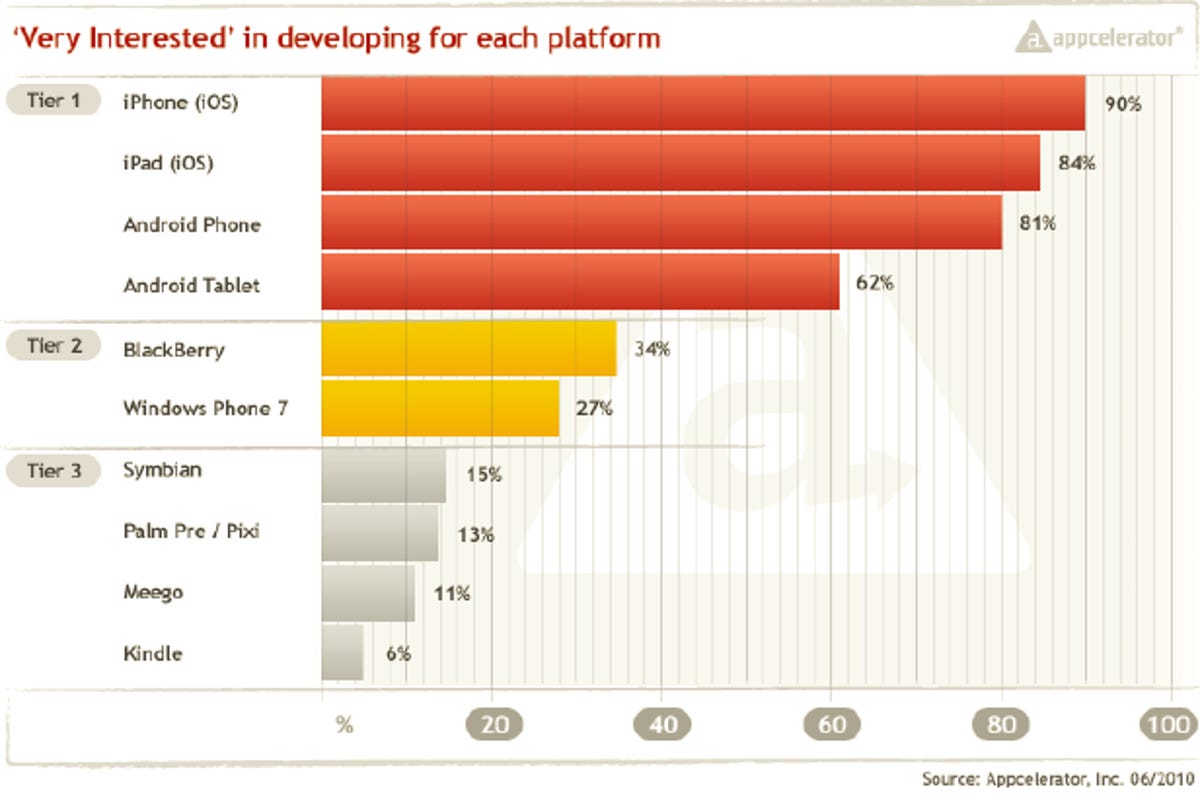Application developers see Apple’s iOS as the top mobile platform for now but have high expectations for Google’s Android, according to a survey released Wednesday.
The “Q2 Mobile Developer Survey” (PDF) was conducted by Appcelerator, which makes the Titantium platform for developing mobile and desktop apps. The survey gauged the opinions of mobile app developers on the six major platforms: Apple’s iOS, Google’s Android, Palm’s (now Hewlett-Packard’s) WebOS, Microsoft’s Phone 7, Nokia’s Symbian/Meego, and RIM’s BlackBerry.
Among the 2,733 developers surveyed in mid-June, Apple and Android were by far the most popular, with 90 percent saying they were very interested in developing for the iPhone and 81 percent very interested in developing for an Android phone. Thirty-four percent were interested in the BlackBerry and 27 percent in Windows Phone, with smaller results for Symbian and WebOS.

Appcelerator
But the competition between Apple and Android goes deeper. Among those surveyed, 85 percent said Apple is currently the biggest market for consumer apps, while 10 percent said the same about Android. A significant 89 percent said Apple has the best app store, market, and commerce capability, while 10 percent expressed the same opinion about Android. And 78 percent said Apple has the best near-term outlook, compared with 16 percent who said the same about Android.
However, 55 percent of the developers said Android has the most capabilities as an OS, compared with 39 percent for Apple. Eighty-six percent said Android is the most open platform, while 8 percent said that about Apple. And 54 percent said Android has the best long-term outlook, compared with 40 percent who said that about Apple.
Developers who favor Apple said they do because the company continues to make the most wanted phone, while those less favorable toward the company said it has become too controlling. Android fans said Google’s OS is highly adaptable, targeting everything from tablets to e-readers to set-top boxes. But those less happy with Android said that its market is too fragmented and that testing across all Android devices costs too much time and money.
Apple’s iPad has also drummed up interest. Among those surveyed, 84 percent said they were very interested in developing for the iPad, while 62 percent expressed interest in developing for an Android tablet.
“In short, Apple and Google are now playing chess while everyone else plays catch up,” Appcelerator concluded from the results. “The surge in popularity for developing tablet applications on the two leading OSes, coupled with second tier platforms seeing flat to declining interest, suggests that Google and Apple are moving the battle from phones to a broader, more long-term platform shootout for ‘anywhere computing.'”



